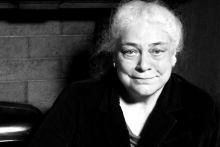A few weeks ago, an odd thing appeared on the New York Times weddings page. There were three wedding announcements, but the same husband appeared in each one. It took a few moments for you to realize that it was actually an ad for the premiere of Big Love, HBO's new drama series on polygamy (which runs on The Movie Network in Ontario).
The series is created and produced by creative and romantic partners Mark V Olsen and Will Scheffer, two gay men who are rather obviously and provocatively riffing on the controversies around same-sex marriage.
The mock announcements nicely demonstrate the connection: the New York Times has been announcing gay and lesbian unions since 2002, two years before same-sex marriages were legal anywhere in the US. A wedding announcement in the New York Times is the ultimate sign of arrival, status writ large - even if there is nothing legal about it. The fake announcement of the three fictitious Big Love marriages played on the same gap between cultural and legal recognition.
The show's creators don't recoil from the association between same-sex marriage and polygamy. They seem to delight in playing on it.

